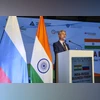India aim to reach an ambitious trade target of $100 billion by 2030, from its current $60 billion, External Affairs Minister S Jaishankar said on Monday. Speaking at the India-Russia Business Forum in Mumbai, Jaishankar emphasised the significance of India-Russia bilateral trade in national currencies, connectivity projects, and outlined key areas where collaboration between the two nations can be expanded. This address also comes ahead of the 25th session of the India-Russia Inter-Governmental Commission, which is likely to expand on the economic partnerships between India and Russia.
“We have a long history of strong convergence and deep friendship that allows us to make the best of both factors. That the two economies are so complementary is also a key consideration. A partnership between an India that has an 8 per cent growth rate for multiple decades ahead, and a Russia that is a key natural resources provider and a major technology leader, will serve both of them and the world well,” the minister said.
Jaishankar emphasised that India’s global approach is ‘not transactional’ but focused on fostering long-term partnerships. He cited recent high-level engagements, including the Annual Summit between President Vladimir Putin and Prime Minister Narendra Modi and their meeting at the Brazil, Russia, India, China, and South Africa (BRICS) summit in Kazan.
Last week, at the Valdai Discussion Club in Moscow, Putin had called India its “natural ally”, mentioning it a “great country” with which it [Russia] could boost cooperation in all areas.
A major area of focus is increasing cooperation in the Russian Far East, building upon discussions held during the recent Annual Summit in Moscow. Putin emphasised the need for a balanced trade relationship, with an increased role for national currency settlements to strengthen economic resilience.
Also Read
“Those occasions have provided a strategic direction, whose economic dimension we seek to realise through this gathering,” Jaishankar said.
Jaishankar noted three crucial connectivity projects as vital to bolstering trade and reducing dependency on traditional routes. These include the International North-South Transport Corridor (INSTC), the Chennai-Vladivostok Corridor, and the Northern Maritime Route, all aimed at expanding trade access and efficiency between the two countries.
“We are all aware of the complementary nature of our respective economies. If we recognise that fully, then it also follows that our approach is not transactional but aimed at building long-term partnerships,” he said.
Adding to this he said, “In energy domains such as oil, gas, coal or uranium, India will always be a major player in the international markets. This applies as well to the demand for fertilisers of various kinds. Constructing a mutually beneficial arrangement will help us both address the volatility and the uncertainty of our times.”
Reflecting on the 75-year India-Russia relationship, Jaishankar concluded that Russia and India's relations extended beyond traditional areas like defense, nuclear energy, and space, building on steadfastness and strategic depth.
(With agency inputs)

)